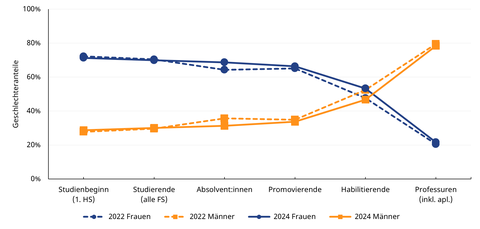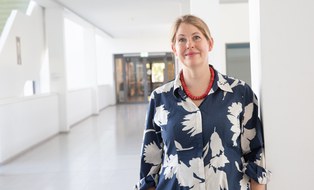Gender Equality
According to statistical surveys, women have continuously made up the majority of first-year students in medicine since 1998. For some years now, the proportion of women studying human medicine has remained constant at two thirds, and in dentistry at three quarters of all students. Women have also made up a clear majority of doctorates at our faculty for years, at around two thirds, and have now caught up with men in terms of habilitations. But this is followed by a drastic slump: Chairs and thus management levels and strategic decision-making positions still are predominantly occupied by men. The direction in which medicine continues to develop and, depending on this, its relevance to society as a whole, is determined by the (lack of) diversity at the level of management and decision-making. Therefore, the question of gender equality and the participation of women in leadership positions in science and research is not only about fulfilling a fundamental right, but also about creating a diversity-sensitive medicine that takes into account and can serve the diversity of society. In order to achieve gender equality here, we Equal Opportunities Officers advise the faculty on improving gender equality.
Table of contents
Current situation at the Faculty of Medicine Dresden

Scherendiagramm der MF-TUD 2022-24
Women make up more than half of the academic staff at the Faculty of Medicine at TU Dresden. The more precarious the employment relationship, the higher the proportion of women. In 2024, 64-78% of doctorates were awarded to women, depending on the doctoral degree, and for the first time more women than men habilitated at the MF-TUD. This means that the career gap for women shown in the scissor diagram as the intersection of the two "scissor arms" is slowly shifting from the point between doctorate and habilitation to the point between habilitation and professorship. Despite this, the proportion of women professors is still very low at 22%. A slightly positive development can only be seen in the W2 professorships, where 26% are now women, while the proportion of women in W3 professorships has stagnated at 15%.
This is why we Equal Opportunities Officers are actively involved in appointment procedures and ensure that the appointment committees work in a way that is fair and open-ended. We document this in our independent statements on the procedures. According to TU Dresden's Equality Concept, faculties are asked to involve us in the process of permanent appointments and appointments to permanent positions. With the continuous compilation of statistical data on gender proportions, which is collected by the Staff Unit Gender Equality and Diversity Management, we identify and name problem areas, draw the faculty's attention to them and advise on how they can be addressed and remedied.
Further information
Position paper "Standpoints for a gender-equitable university policy"
Universities provide social impetus and, as public institutions, are bound by legislation. However, the gender equality enshrined in the Basic Law has not been fully implemented at universities either. Gender bias and discriminatory mechanisms can be found at universities just as elsewhere. The Federal Conference of Women's and Equal Opportunities Officers at Universities (bukof e.V.) promotes a gender and socio-political cultural change as a gender policy voice in the science and higher education policy discourse: Position paper (PDF)
TIN*inclusive university
As a TIN*-inclusive university (TIN*: trans, inter- and non-binary gender identity), TU Dresden is committed to all gender identities of its university members and recognizes the so-called dgti supplementary ID card. It also offers peer counseling for queer university members: Contact Fay Uhlmann at .
Situation of women in medicine, especially in hematology and oncology
The German Society for Hematology and Medical Oncology deals with the situation of women in medicine in general and in hematology and oncology in particular in volumes 5 and 19 of its health policy publication series: DGHO publication series
Call for more women in management positions in medicine
The German Medical Women's Association (DÄB) calls for "... equality to be tackled in medicine too. In the future, a balanced gender ratio should also be reflected in leadership positions such as chief physicians, hospital management, in the committees of medical self-government and science." Like the ProQuote Medicine initiative, the DÄB is therefore calling for a binding fixed quota in the healthcare sector as long as there is no gender balance.
Contact me
Feel free to contact me if you have any questions about aspects of equal opportunities and gender equality in studies and careers, e.g. appointment and personnel procedures, experienced or observed discrimination, project ideas and much more.
 © Stephan Wiegand
© Stephan Wiegand
Leitung DSCS und Gleichstellungsbeauftragte der Fakultät
NameKatja El-Armouche
Send encrypted email via the SecureMail portal (for TUD external users only).

